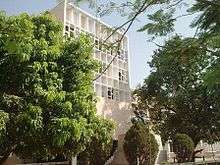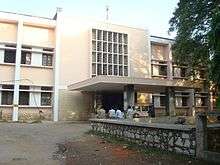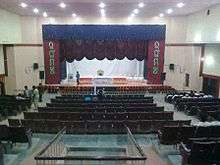Veer Surendra Sai Institute of Medical Sciences and Research
| ବୀର ସୁରେନ୍ଦ୍ର ସାଏ ଆୟୁର୍ବିଜ୍ଞାନ ଓ ଗବେଶଣା ପ୍ରତିଷ୍ଠାନ | |
|
Seal of VSS Medical College | |
| Motto | Citus, Altius, Fortius |
|---|---|
| Type | Government Institution |
| Established | 1959 |
| Dean | Professor (Dr.) Bijaya Kumar Dutta |
| Medical Superintendent | Professor (Dr.) Braja Mohan Mishra |
Academic staff | 250 |
| Undergraduates | 150 per year |
| Postgraduates | 74 per year |
| Location |
Burla, Sambalpur, Odisha, India 21°30′N 83°52′E / 21.5°N 83.87°ECoordinates: 21°30′N 83°52′E / 21.5°N 83.87°E |
| Campus | Burla |
| Affiliations | Sambalpur University |
| Website |
www |
Veer Surendra Sai Institute of Medical Sciences and Research (VIMSAR) (Odia:ବୀର ସୁରେନ୍ଦ୍ର ସାଏ ଆୟୁର୍ବିଜ୍ଞାନ ଓ ଗବେଶଣା ପ୍ରତିଷ୍ଠାନ) previously known as Veer Surendra Sai Medical College and Hospital (VSSMCH) is a premier government-run medical college and hospital in the Indian state of Odisha. Established in 1959, it is one of the oldest institutes in Odisha for imparting highly specialized medical education at both the undergraduate and postgraduate levels. VSS, as it is popularly known, is recognized, regulated and monitored by the Medical Council of India (MCI) in charge of the medical education of India. In 2009, the college celebrated its golden jubilee.
Location

VSS Medical College is located in Burla, a small town on the banks of the Mahanadi River in the Sambalpur district of Western Odisha, 15 km from the city of Sambalpur. Known as the Education City,[1] it is also the site of Sambalpur University and Veer Surendra Sai University of Technology, which are a kilometer away on either side of VSS Medical College. http://www.vimsar.ac.in/location.php
The crest
The emblem adopted by VIMSAR is dominated by the lions of Sarnath, Lion Capital of Emperor Asoka. The three lions visible, one facing to the front and the other two to the sides (the one facing behind is out of view) represent Supremacy and Invincibility.
The wheel implies relentless Activity, Indefatigability and eternal Creativity.
The Caduceus of Hermes consisting of a staff of Aesculapius with two snakes entwined about it, topped by a pair of wings represents the universal insignia of the medical profession. Citus (faster, swifter, second to none), Altius (soaring high), and Fortius (braver, stronger, robust and invincible) are an adaptation from the Olympic motto.
Genesis and growth
In 1958, to provide a solution to healthcare problems in western Odisha, the then Chief Minister of Odisha, Dr. Harekrushna Mahatab, took the decision to set up a medical college at Burla, the second in the state and the 54th in the country. Consequently, the Burla Medical College (BMC) came into existence in July, 1959, with 41 male and 9 female students selected from SCB Medical College in Cuttack to become its first batch of students.[2]
The College started to function in the present OCB building, under the guidance of Prof. Dr. Radhanath Mishra as its first principal. Initially, the MCI refused to recognize BMC, citing gross infrastructural inadequacy. So, a new sprawling campus was designed, complete with the main college building, the hospital building, hostels and staff quarters. Construction began on 12 February 1961. On completion of the work in 1966, the college was moved to the new campus and it finally received MCI approval in 1967. In 1969, it was rechristened Veer Surendra Sai Medical College in honor of Veer Surendra Sai.
Over time, the college has added many facilities, including the following:
- 1961- opened Radio diagnosis department
- 1966- opened Orthopedics department
- 1970- opened Pediatrics department
- 1979- opened Cardiology Super-specialty
- 1980- opened Pulmonary Medicine department & Neurosurgery Super-specialty
- 1981- opened Nephrology Super-specialty, New Obst. & Gyn. building
- 1984- opened Genito-urinary Surgery Super-specialty
- 1985- Indira Gandhi Auditorium, Radiotherapy Cobalt-60 unit
- 1996- opened Psychiatry department
- 1997- new Central Library Building
- 1999- opened ICU in General Medicine Ward
- 2005- Regional Diagnostic Center
- 2006- Trauma Unit, Burn Unit, Neonatal ICU
- 2007- seats increased to 150
- 2008- new Emergency building, new Orthopedics building
- 2010- new Super-specialty building, new multi utility building

Academics
VSS Medical College offers both undergraduate and postgraduate courses in the field of medical science as well as other paramedical courses.
Undergraduate courses
The college offers the four and a half year MBBS course with a one-year compulsory rotating internship in affiliated hospitals to a maximum of 150 students per year.
Admission to this course is extremely competitive and strictly on the basis of merit. Out of the 150, 22 seats are filled through the All India Pre-Medical Test (AIPMT) conducted by the CBSE and the remaining 128 seats are filled through the Odisha JEE held every year. The acceptance rate to this course is barely 0.2%, i.e. 1 in every 500 aspirants is given a place.
Postgraduate courses

The college offers 74 places in postgraduate courses. The admission is through Odisha Post Graduate medical Examination and at the national level through All India Post Graduate Medical Entrance Examination (AIPGMEE). 50% of the places are reserved for in-service candidates. The courses award the degrees of MD or MS, in various fields.
Paramedical courses
- Diploma in Medical Laboratory Technology (MLT): 30 places
- Diploma in Medical Radiology Technology (MRT): 10 places
- Diploma in General Nursing and Midwifery (GNM): 50 places
Student life
The students’ community in VSS Medical College is a confluence of diverse cultures and ethnicities, as students from all corners of the country study there. Students live as a very close-knit family amidst an environment of peace, mutual respect and harmony.

Residential facilities
The college has seven hostels for males of which five are for undergraduates, one for interns and one for postgraduates. It also has four ladies' hostels, three of which are for undergraduate girls and one for nursing students. One more new hostel, for staff nurses is under construction. A plan to construct two more gents' hostels for undergraduates and postgraduates is in the pipeline.
Student facilities
The college has a good infrastructure. All lecture theaters and laboratories are well-maintained and well-equipped. The Central Library has over 50,000 books and journals and can easily accommodate 500 students. There is also a modern auditorium with a capacity of 550, which will be fully air-conditioned very soon. The college has facilities for outdoor sports like cricket, football, basketball and volleyball; indoor facilities for badminton and table tennis; and a well-equipped gymnasium.

Students' Union
Students are represented by an undergraduate students’ union, elected annually by a campus-wide election from the students of the fourth year in March–April. The union is very powerful and acts to protect the interests and rights of the student community. The office holders of the students’ union organise various programmes, activities and inter-class competitions throughout the year which culminates with the annual function of the union in December. Postgraduate students are represented by a similar union, known as the Junior Doctors’ Association.
The inter-medical college festival, “Euphoria”, is organized every three years by the students’ union, which attracts participation from all of the medical colleges in the state. A large number of students gather for a four-day extravaganza and participate in various cultural, dramatic, literary and sports competitions.
Students of the college excel in a number of extracurricular activities, emphasizing the fact that mere syllabus study is not enough. Many have tasted success in various state and national level competitions. “PRAYAS” is a non-profit organization formed by the students which strives to provide proper medical treatment to financially challenged persons by providing free medicines and also to create a large pool of donors to counter the perennial shortage of blood units in the hospital's blood bank.
Medical services


Being the Tertiary Referral Center of western Odisha, the college hospital caters to the needs of approximately 6 crore people belonging to twelve districts of Odisha, four districts of Chhattisgarh and two districts of Jharkhand.
21 specialty teaching departments and six super-specialty departments are working in the hospital, as follows:
- Cardiology
- Nephrology
- Neurology
- Hematology
- Genito-urinary surgery
- Neurosurgery
The main building houses the college block along with the non-clinical and paraclinical departments. The outpatient department block, the inpatient departments of major departments, the blood bank etc. are located in the main campus in the hospital block. Psychiatry, pediatrics, radiotherapy and pulmonary medicine departments are a short distance from the main building.
The hospital has a total of 772 beds overall, including those in the super specialty departments. The departmental breakdown is as follows-
- Medicine (4 units): 169
- Pediatrics (2 units): 70
- Pulmonary medicine: 50
- Skin & VD: 36
- Psychiatry: 20
- Surgery (4 units): 161
- Orthopedic surgery (2 units): 60
- Ophthalmology: 44
- Otorhinolaryngology: 38
- Radiotherapy: 24
- Obstetrics & ANC: 56
- Gynecology: 34
- Pediatric prehospital care: 10

Future
- Declaration of VSS Medical College, Burla as an autonomous organization like AIIMS.
- VSSMC to be renamed VSS institute of Medical Sciences & Research (VIMSAR).
- M.C.I. recognition for the P.G. department of 'skin and venereal diseases' and 'forensic medicine & toxicology'.
- Opening of super specialized units like clinical hematology, endocrinology, gastroenterology, plastic surgery, pediatric surgery and cardiothoracic surgery.
See also
- Higher education in Odisha
- Institutes of national importance in Odisha
- List of medical colleges in India
- Education in India
References
External links
| Wikimedia Commons has media related to Veer Surendra Sai Institute of Medical Sciences and Research. |
